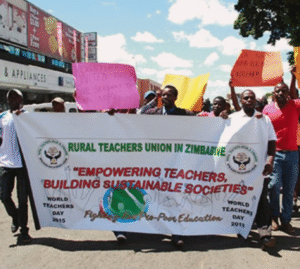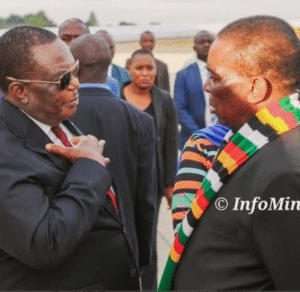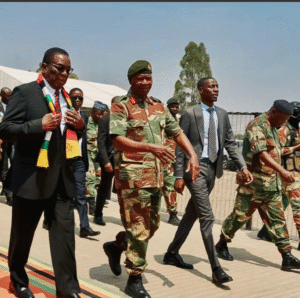UNPRECEDENTED MOVE: MILITARISATION OF POLITICS TAKES A LEAP IN ZIMBABWE

In a move that has sent shockwaves through the political corridors of Zimbabwe, President Emmerson Mnangagwa has made a dramatic and potentially unlawful appointment. He has designated Zimbabwe Defence Forces commander General Phillip Valerio Sibanda, known within the liberation struggle Zipra circles as Cde Gwenzi, as an ex-officio member of the Zanu PF’s core decision-making organ, the politburo. This recent manoeuvre is seen by many as a part of an escalating coup-proofing strategy and an attempt to further militarise the political landscape of Zimbabwe.
The intensity of this shift became more pronounced following the recent appointment of Lieutenant-General Anselem Nhamo Sanyatwe as the Zimbabwe National Army commander amidst substantial political pressure from the military ranks. Sanyatwe, the former commander of the Presidential Guard, played a pivotal role in orchestrating the 2017 coup against the late former president Robert Mugabe. He is not only a close ally of Vice-President Constantino Chiwenga but also a figure whom President Mnangagwa purportedly distrusts.
The announcement of Sibanda’s appointment came as a surprise during the Zanu PF annual conference held in Gweru. While addressing the attendees, President Mnangagwa stated, “The amended 2023 Party Constitution gives impetus, urgency and renewed focus to the socio-economic and political realities of our country towards lifting many out of poverty and into prosperity.” He went on to mention the loss of one of their party stalwarts, Cde Joshua Teke Malinga, who held the position of Secretary for People with Disabilities, and announced the appointment of Cde Rose Mpofu of Matabeleland South Province as a Politburo Member and the new Secretary for People with Disabilities. In addition, he introduced ‘Cde Gwenzi’, General Phillip Valerio Sibanda, as an Ex Officio Member of the Politburo.
However, this appointment has raised more than a few eyebrows as it seemingly clashes with Section 211 of the Zimbabwean constitution. This section mandates that “The Defence Forces must respect the fundamental rights and freedoms of all persons and be non-partisan, national in character, patriotic, professional and subordinate to the civilian authority as established by this constitution.” The appointment of General Sibanda to such a political position seems to deviate from the constitutional directive, challenging the core principle of keeping the military and political spheres distinct.
The infusion of military figures into key political positions is not just a deviation from constitutional norms, but also a potential harbinger of an autocratic governance style. The military’s infiltration into politics threatens to undermine the democratic ethos and could lead to a concentration of power, further estranging the civil-military relations in Zimbabwe.
As the news reverberates across the nation, citizens, political analysts, and constitutional experts are left pondering over the repercussions of this bold move by President Mnangagwa. The militarisation of politics, they fear, could herald a new era of authoritative rule, stifling the democratic spirit that is essential for the nation’s progress and stability.
This unprecedented action by President Mnangagwa has certainly propelled Zimbabwe into uncharted political waters, with an uncertain voyage ahead.




